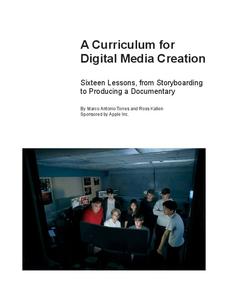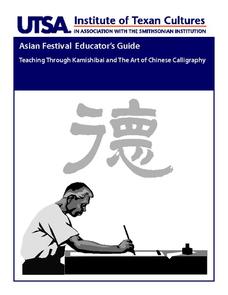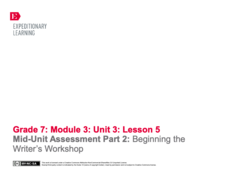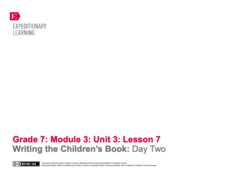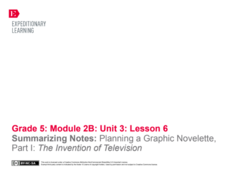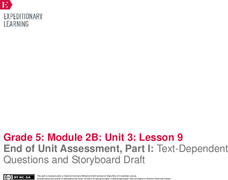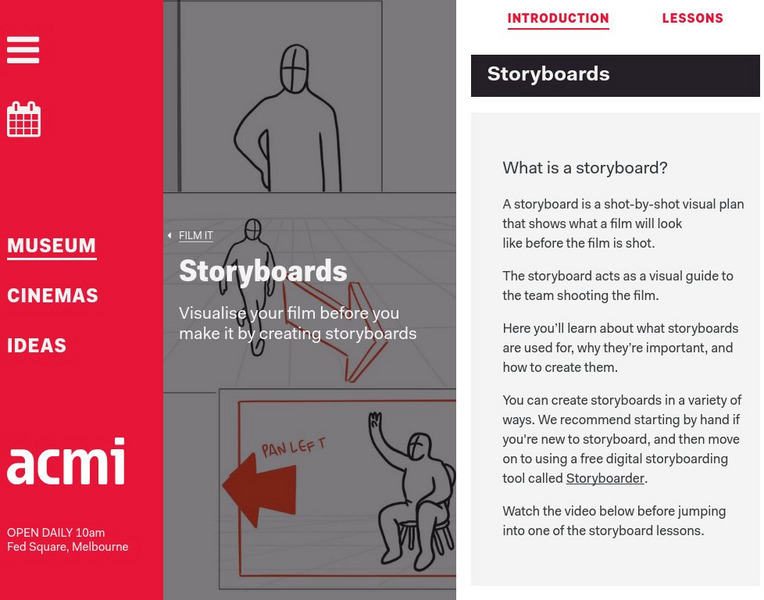Scholastic
Story Board
Invite your pupils to tell and show what happened in a story that they read by filling out this organizer. Using images and words, kids can fill out the six panels provided here to demonstrate understanding of the sequence of events and...
Apple
A Curriculum for Digital Media Creation
Consumer technology has made it possible for filmmakers to create entire movies from the comfort of their home computer. Guide high school film buffs through the process of designing a documentary with an extensive unit published by...
UTSA Institute of Texas Cultures
Teaching Through Kamishibai and The Art of Chinese Calligraphy
Young learners discover kamishibai, a popular Japanese storytelling art, and explore how these Japanese folktales illustrate the country's cultural themes and values through discussion and storyboarding.
PreKinders
Ten Red Apples Flannel Board Set
When you finish reading Ten Red Apples by Pat Hutchins, give your kindergartners these felt pieces for their felt storyboard. The pieces include big red apples, farmers, animals, and a big apple tree.
Beverly Hills High School
The French Revolution
Aspiring filmmakers and budding historians alike will love a storyboard project on the French Revolution. Learners plan a Hollywood blockbuster, complete with script and full storyboards, that cover important events of the French...
EngageNY
Writing the Children’s Book: Day One
With a brief mini-lesson, scholars learn about using strong verbs, sensory details, and precise descriptions. Next, pupils continue working on their children's book storyboards before choosing their strongest pages for peer critiques.
EngageNY
Mid-Unit Assessment Part 2: Beginning the Writer’s Workshop
Writers learn about using sensory details as they revise bland sentences with more vivid language. Next, they begin writing the first drafts of their children's books, completing storyboards to effectively plan their writing.
EngageNY
Writing the Children’s Book: Day Two
Following a brief mini-lesson on using dialogue in fiction, young writers continue day two of their writing workshop. They work on the second half of their Children's Book Storyboards, and then they turn and talk with partners to reflect...
EngageNY
Summarizing Notes: Planning a Graphic Novelette Part 1: The Invention of Television
What's the story? Learners create the first of four storyboards about the invention of the television, incorporating narrative techniques and descriptive details. Next, they offer and receive feedback by participating in a peer critique...
EngageNY
End of Unit Assessment, Part II: Storyboard Draft, Sections 2 and 3
It's time to demonstrate knowledge. With the instructive resource, pupils complete the second part of the end of unit assessment. They develop sections two and three of their storyboards about an invention, add visual elements, and then...
EngageNY
End of Unit Assessment, Part III: Storyboard Draft, Section 4
Reflection is the best teacher. Using the resource, scholars complete the final part of their end of unit assessment, the fourth section of their storyboard about an invention. Next, they track their progress using a self-reflection...
EngageNY
Peer Critique and Revision: Storyboard, Sections 1-4
Teamwork makes the dream work. Pupils participate in a peer critique process, using forms to offer constructive advice about each other's storyboards. Next, scholars revise their storyboards based on the feedback, and then share their...
EngageNY
Storyboard Revision: Managing the Sequence of Events and Using Sensory Details
Mastering techniques from the resource, pupils give life to their writing, revising their storyboards to include sensory details and transitions. To finish, they participate in a peer critique process and use the feedback to further...
EngageNY
End of Unit Assessment, Part 1: Text-Dependent Questions and Storyboard Draft: “You Can Do a Graphic Novel” Excerpt
Eyes on the finish line. Serving as the first part of the end of unit assessment, learners answer questions based on a text about how to write a graphic novel. Using what they've learned, they then create a storyboard about the invention...
Music Publishers Association of the United States
I Made It. I Own It. Please Don't Steal It.
Explore the world of copyright law with a variety of activities to instill the importance of respecting creative property. Scholars watch an animated tale then take part in a grand conversation detailing the video's main idea, details,...
British Council
Advertisement Storyboard
Lessons about advertising slogans are GR-R-REAT! Using the resource, pupils engage in an interactive activity to match advertisement blurbs with their corresponding product names. Next, they discuss famous slogans and identify where to...
Australian Centre For the Moving Image
Dreamworks Animation Character Design
Dive into animation creation using Dreamworks® animated films. Compare and contrast characters, wonder and ponder why the plot is so important, and think of background and themes as your creativity unrolls onto paper.
Childnet
Childnet: Online Safety: Film Competition 2021
For the last 12 years, the Childnet Film Competition has challenged young filmmakers to create a short film or a storyboard in response to a given theme. All entries must contain a positive message and be able to educate other young...
Other
Australian Centre for the Moving Image: Storyboard
Use this online resource to create your own storyboard.
Khan Academy
Khan Academy: Laying Out a Scene Using Translation
In this activity, students, given a storyboard, lay out a scene using translation.
Other popular searches
- Story Boards
- Story Element Game Board
- Digital Story Boards
- Story Boards Comics
- Sequencing Story Boards
- Story Boards for Plays
- Technology Story Boards
- Using Story Boards
- Story Boards for Novels
- Story Boarding
- Story Boards for Movies
- Story Boards for Plot

